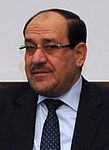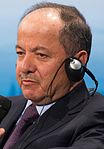Iraq is a federal parliamentary representative democratic republic. It is a multi-party system whereby the executive power is exercised by the Prime Minister of the Council of Ministers as the head of government, the President of Iraq as the head of state, and legislative power is vested in the Council of Representatives.

The Iraqi Islamic Party is the largest Sunni Islamist political party in Iraq as well as the most prominent member of the Iraqi Accord Front political coalition. It was part of the government of Prime Minister Nouri al-Maliki and is part of the current government of Haider al-Abadi since 2014. Osama Tawfiq al-Tikriti succeeded Vice-President Tariq al-Hashimi as the party's secretary-general on 24 May 2009, who was succeeded in July 2011 by Ayad al-Samarrai.

The National Iraqi Alliance, also known as the Watani List, is an Iraqi electoral coalition that contested the 2010 Iraqi legislative election. The Alliance is mainly composed of Shi'a Islamist parties. The alliance was created by the Supreme Council for Islamic Revolution in Iraq to contest in the January 2005 and December 2005 under the name United Iraqi Alliance, when it included all Iraq's major Shi'a parties. The United Iraqi Alliance won both those of elections however later fell apart after several major parties left the alliance due to disputes with Prime Minister Nouri al-Maliki and the Supreme Council.
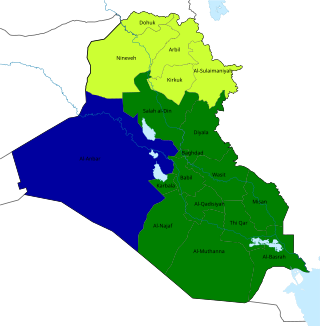
Parliamentary elections were held in Iraq on 30 January 2005 to elect the new National Assembly, alongside governorate elections and a parliamentary election in Kurdistan Region. The 275-member legislature had been created under the Transitional Law during the international occupation. The newly elected body was given a mandate to write a new constitution and exercise legislative functions until the new constitution came into effect. The elections also led to the formation of the Iraqi Transitional Government.
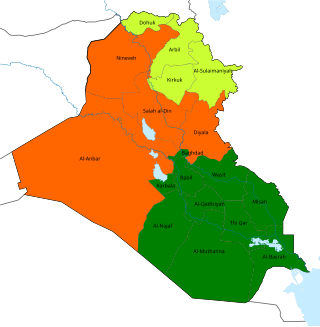
Parliamentary elections were held in Iraq on 15 December 2005, following the approval of a new constitution in a referendum on 15 October.
The first government of Iraq led by Prime Minister Nouri al-Maliki took office on May 20, 2006 following approval by the members of the Iraqi National Assembly. This followed the general election in December 2005. The government succeeded the Iraqi Transitional Government which had continued in office in a caretaker capacity until the new government was formed and confirmed.

Osama Abdul Aziz al-Nujaifi is an Iraqi politician and served as one of the three vice presidents of the country, from 2014 to 2015 and 2016 to 2018. As the speaker of the Council of Representatives, the informal leader of the moderate Sunni al-Hadba party was the highest ranking Sunni politician of Iraq.

Governorate or provincial elections were held in Iraq on 31 January 2009, to replace the local councils in fourteen of the eighteen governorates of Iraq that were elected in the 2005 Iraqi governorate elections. 14,431 candidates, including 3,912 women, contested 440 seats. The candidates came from over 400 parties, 75% of which were newly formed.

Parliamentary elections were held in Iraq on 7 March 2010. The elections decided the 325 members of the Council of Representatives who would elect the prime minister and president. The elections resulted in a partial victory for the Iraqi National Movement, led by former Interim Prime Minister Ayad Allawi, which won 91 seats, making it the largest alliance in the Council. The State of Law Coalition, led by incumbent Prime Minister Nouri Al-Maliki, was the second largest grouping with 89 seats.

The al-Hadba party is a political party formed to contest the 2009 Iraqi governorate elections in Ninawa province. It is mostly made up of Sunni Arabs. Its leading member Atheel al-Nujaifi is brother of Osama al-Nujaifi who is part of the Iraqi National List led by former Iraqi Prime Minister, Ayad Allawi. It has also been reported that members of the coalition have the backing of Shia Prime Minister Nouri al-Maliki.

The Nineveh Governorate election of 2009 was held on 31 January 2009 alongside elections for all other governorates outside Iraqi Kurdistan and Kirkuk Governorate.

The State of Law Coalition, also known as Rule of Law Coalition, is an Iraqi political coalition formed for the 2009 Iraqi governorate elections by the Prime Minister of Iraq at the time, Nouri al-Maliki, of the Islamic Dawa Party.

The National Reform Trend, also known as the National Reform Movement or as Islah, is an Iraqi political party that was founded in 2008 by former Iraqi prime minister, Ibrahim al-Jaafari. It is a Shiite-Islamic-based party.
This article concerns the formation process of the Al Maliki I Government of Iraq in the aftermath of the Iraq National Assembly being elected on December 15, 2005. Due to disputes over alleged vote-rigging the results of the election were only certified by the Independent Electoral Commission of Iraq on February 10, 2006.
In the aftermath of the 2010 election, great attention was given to the decision on who should be the next Iraqi PM. Both al-Iraqiyya's Allawi and the State of Law coalition's al-Maliki laid claim to the post, so it was seen as up to the Kurdish parties and the Iraqi National Alliance to decide this matter.

Governorate or provincial elections were held in Iraq on 20 April 2013, to replace the local councils in the governorates of Iraq that were elected in the Iraqi governorate elections of 2009. Elections took place in 12 of Iraq's 18 governorates. Elections didn't take place in the 3 governorates forming the Kurdistan Region or Kirkuk, Anbar, or Nineveh, meaning that a total of 378 provincial council seats were up for election.
The Al Anbar governorate election of 2013 was held on 20 June 2013 alongside elections for Nineveh.

The 2013 Nineveh Governorate election in Iraq was held on 20 June with elections for the Al Anbar Governorate. Due to security problems, turnout was less than half that of the 2009 election. This election saw Sunni Arab parties lose a number of seats to minority parties.
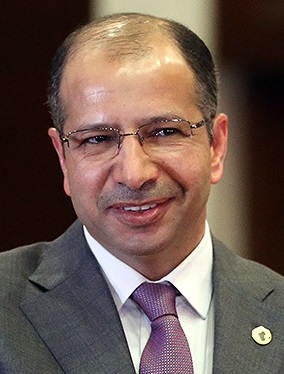
Salim Abdullah al-Jabouri (Arabic: سليم عبدالله الجبوري; born 12 August 1971) is an Iraqi politician who was elected as the Speaker of the Iraqi Parliament on 15 July 2014 until 1 July 2018.

Parliamentary elections were held in Iraq on 12 May 2018. The elections decided the 329 members of the Council of Representatives, the country's unicameral legislature, who in turn will elect the Iraqi president and prime minister. The Iraqi parliament ordered a manual recount of the results on 6 June 2018. On 10 June 2018, a storage site in Baghdad housing roughly half of the ballots from the May parliamentary election caught fire.

